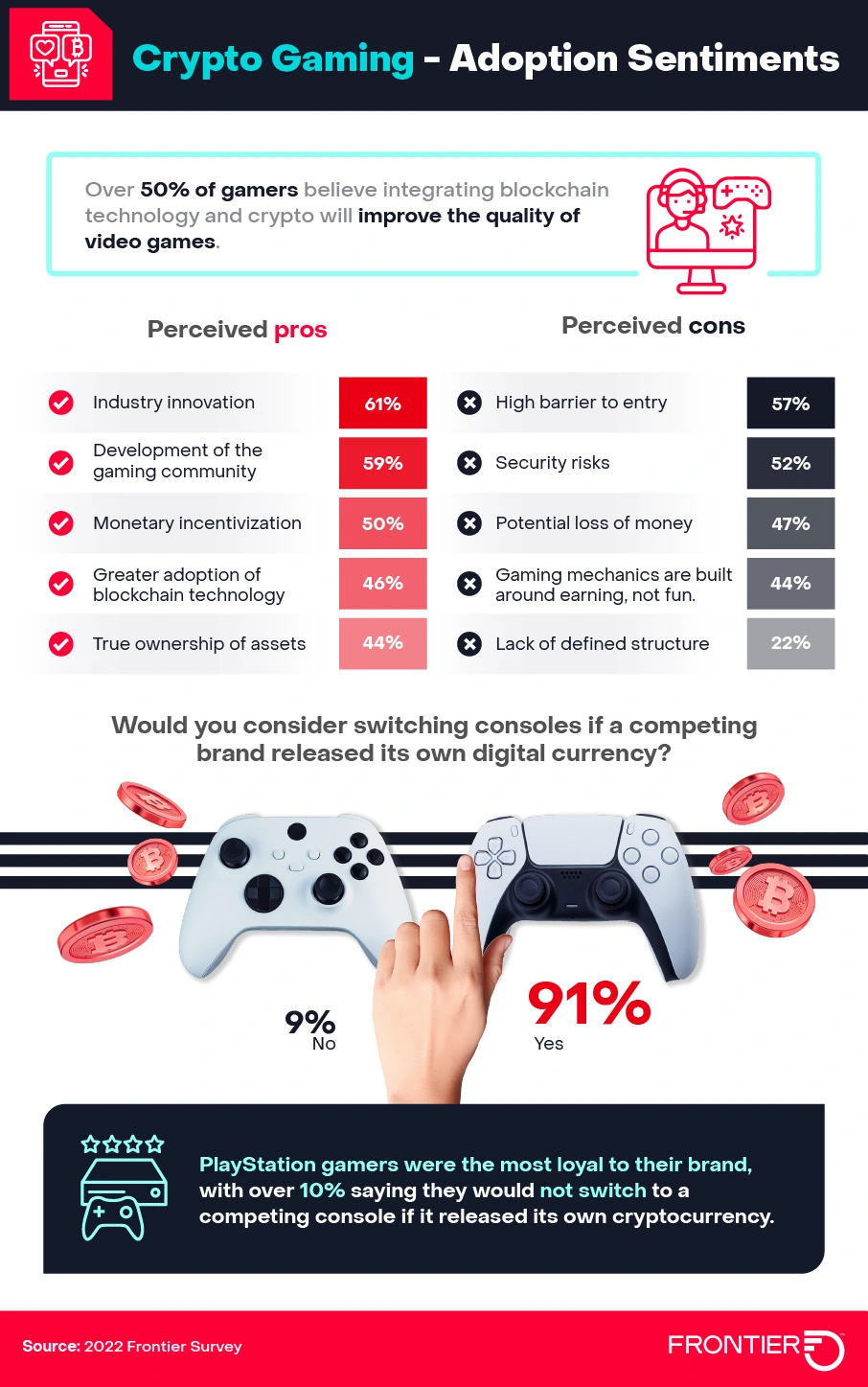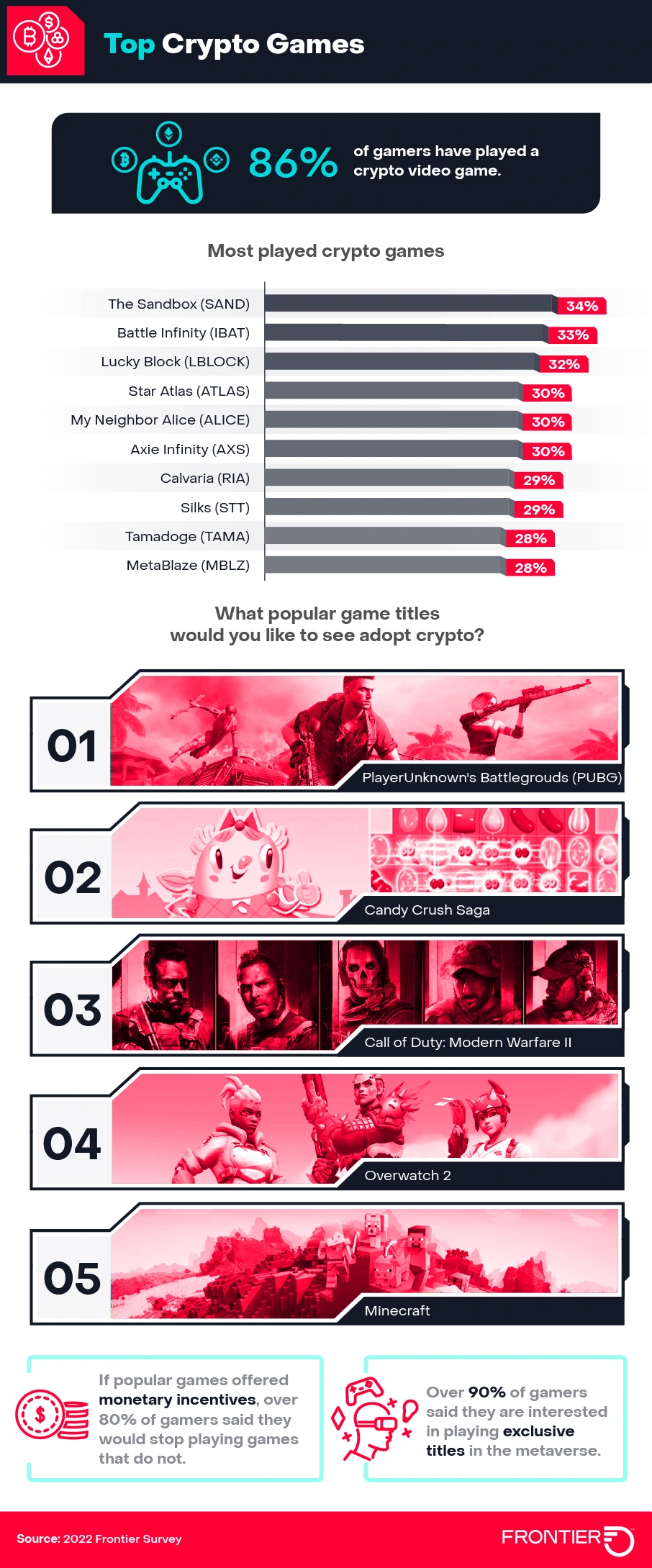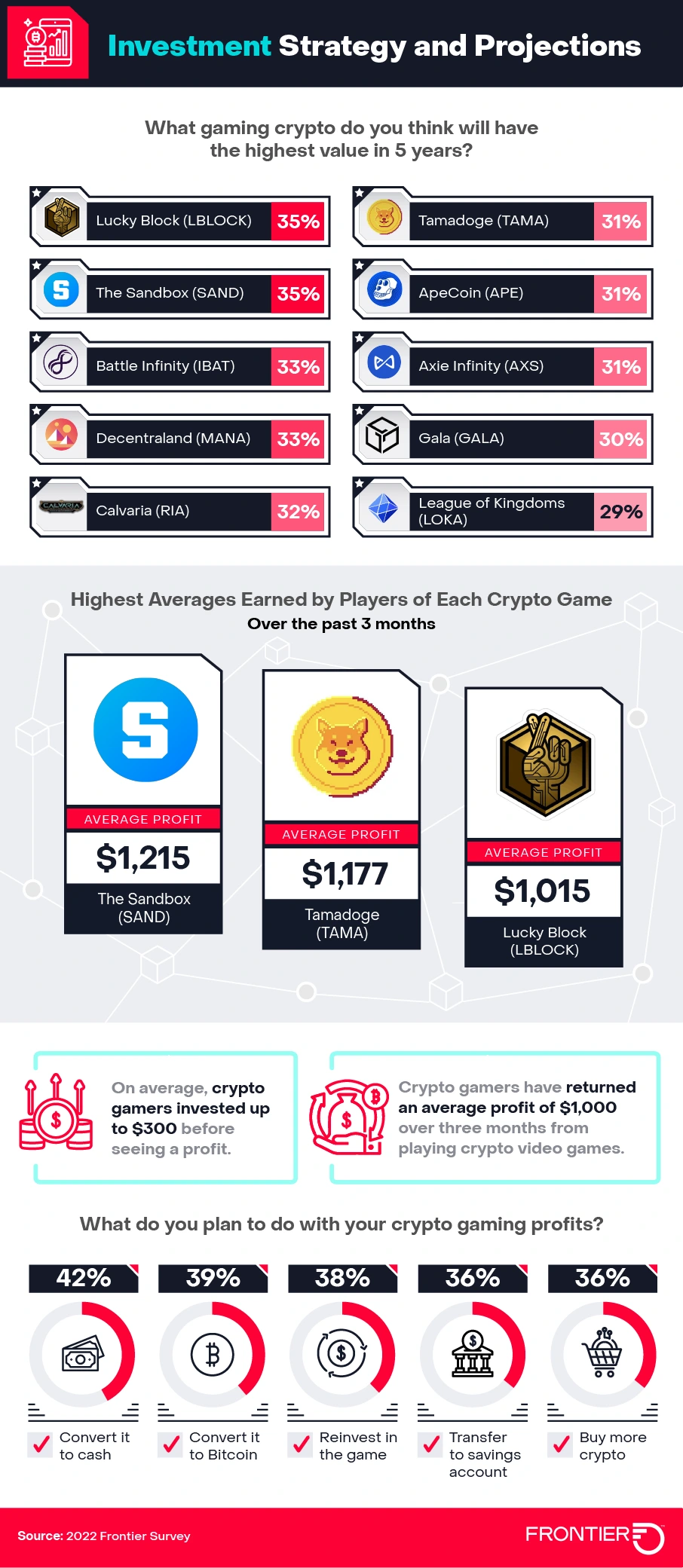Profiling crypto gamers: how do they feel about crypto in the gaming industry?

Press start to begin
Cryptocurrency has infiltrated many aspects of our lives, including video games. Crypto games are popping up across the map, offering players various gaming experiences on the blockchain. Gameplay ranges from aesthetically pleasing farming games to horse-betting-style gambling simulators.
Despite the many different genres, these games all have one thing in common: the use of cryptocurrency to play and buy in-game items. What do gamers think about these new developments? We surveyed 1,000 of them about the integration of cryptocurrency into video games. Here’s what we found.
Key takeaways
- 86% of gamers have played a crypto video game.
- Over 50% of gamers believe integrating blockchain technology and crypto will improve the quality of video games.
- Crypto gamers have returned an average profit of $1,000 over three months from playing crypto video games.
Playing to earn
Crypto gaming lets players earn cryptocurrency, use it to make in-game purchases and even gamble. How do the players feel about these new additions?

Crypto gaming has already taken off in many forms. Some games reward players for completing quests with crypto, while others offer casino-like or betting experiences. Many gamers believe that crypto could be the future of online gaming. We found that over 50% of gamers believe integrating blockchain technology and crypto into the gaming world will improve the quality of video games as well.
Pros of crypto gaming
The gamers we surveyed anticipated many positive effects of crypto gaming. The most common “pro” that gamers looked forward to was industry innovations (61%), indicating that many gamers welcome the new angle of crypto. Other top pros included the development of the gaming community (59%) and monetary incentives (50%).
Cons of crypto gaming
Gamers also cited many potential negative impacts. The most common one was a high barrier to entry, which 57% of gamers worried about. Although cryptocurrency might seem like an increasingly common topic, only about 59 million Americans (18% of the population) owned any in 2021. This may mean many casual video gamers likely aren’t interested in purchasing any.
Other perceived adverse effects included security risks (52%) and the potential to lose money (47%). Game mechanics might also begin focusing too much on earning money rather than fun, which concerned 44% of the gamers we surveyed.
Most gamers would switch consoles for crypto
Despite the cons, most gamers surveyed were interested in the idea of crypto gaming. In fact, 91% said they would consider switching consoles if a competing brand released its own digital currency. PlayStation gamers were the least likely to say so, proving them to be the most loyal to their brand.
Top crypto gaming titles
After learning how gamers feel about crypto gaming, we wanted to find the most popular titles. Here are the games respondents have played the most and which popular games they hope will soon adopt crypto.

Most popular crypto games: The Sandbox, Battle Infinity and Lucky Block
The majority of gamers we surveyed (86%) have played a crypto game before. Topping the list of the most played crypto games is The Sandbox, a community-driven platform with $1.58 billion in market capitalization where users can create their own 3D worlds and games.
Battle Infinity, the second-most played crypto game, consists of play-to-earn fantasy sports taking place in the “Battle Arena” metaverse world where players can stake IBAT cryptocurrency to increase their earnings. The third-most played game, Lucky Block, features competitions where players can earn cryptocurrency or tangible prizes like houses, cars and vacations.
Other crypto games on the list, like Axie Infinity and My Neighbor Alice, are more akin to “traditional” games that non-crypto players would recognize. For example, Axie Infinity allows players to collect, breed and battle Axies, Pokemon-like creatures that players own as NFTs. In My Neighbor Alice, players can farm, own islands and build new items.
Crypto gaming in the metaverse
Over 90% of gamers said they’re interested in playing metaverse-exclusive titles (games not available on other platforms — only in the metaverse). Additionally, 80% of gamers said they would stop playing games that do not offer monetary incentives if popular games started doing so. This finding poses a challenge and an opportunity for traditional gaming companies as they navigate the increasing adoption of crypto and the metaverse.
In particular, gamers said they want crypto integrated into games like PlayerUnknown’s Battlegrounds (PUBG), Candy Crush Saga and Call of Duty: Modern Warfare II.
Is crypto gaming time well spent?
We now know that many gamers are flocking to crypto games, but is it worth their while? We wanted to find out how much they’ve earned from their gameplay and what they do with those earnings.

Crypto gamers predict which gaming tokens will be worth the most in 5 years
Crypto games usually have their own forms of cryptocurrency that gamers can use to make in-store purchases, earn more cryptocurrency and convert it to other forms of crypto or cash. Of the current gaming currencies, gamers predict that LBLOCK (35%), SAND (35%) and IBAT or MANA (both 33%) will be the most valuable gaming cryptos in five years. These are the currencies for Lucky Block, The Sandbox, Battle Infinity and Decentraland, respectively.
Most lucrative crypto games: The Sandbox, Tamadoge and Lucky Block
The gamers we surveyed did make a profit on the games they played — after investing money in the gaming coins first, of course. On average, crypto gamers had to invest up to $300 in a game before seeing a profit, highlighting respondents’ worries about crypto gaming having a high barrier to entry. After that investment, however, crypto gamers have returned an average of $1,000 in profit after three months of playing crypto games.
On average, The Sandbox (SAND), Tamadoge (TAMA) and Lucky Block (LBLOCK) have returned the highest profits to players, with $1,215, $1,117 and $1,015 three-month average gains, respectively.
How gamers use crypto profits
Players can use crypto earnings as they wish, and their spending choices might depend on the game they play and how much they profit from it. Most players (42%) converted their earnings to cash, but some converted it to Bitcoin (39%) or used it to buy another cryptocurrency (36%). Other common choices included reinvesting the money back into the game (38%) and transferring the money to a savings account (36%).
Is it time to invest in crypto gaming?
For those interested in cryptocurrency, crypto gaming is a fun way to earn more of it, buy NFTs and possibly make a profit. Play-to-earn games require initial investments, but gamers can increase their earnings the more time they dedicate to the game. Now is a good time to get into the crypto gaming industry, with games becoming increasingly popular but not overly so (yet).
While popular games that weren’t designed with crypto in mind (like Minecraft and Fortnite) haven’t yet incorporated crypto elements, more companies might take the leap if the demand is high enough. But how that plays out remains to be seen.
Methodology
We surveyed 1,000 avid gamers about their sentiments toward integrating cryptocurrency into video games. The mean age of respondents was 34 years old. Among them, 60% were male and 40% were female. Respondents comprised the following generational breakdown: 25% Gen Z, 45% millennials, 20% Gen X and 10% baby boomers.
Disclaimer: The information on this website is for general informational purposes only. Frontier makes no representation or warranty, express or implied.
About Frontier
Frontier provides affordable high-speed and fiber internet to customers across the country. A fast and reliable internet connection reduces download and upload duration, allowing players to spend less time waiting and more time gaming.
Fair use statement
If you’re a gamer who enjoyed our study, you’re welcome to share it. We only ask that you link back to the findings and that your purposes are noncommercial.